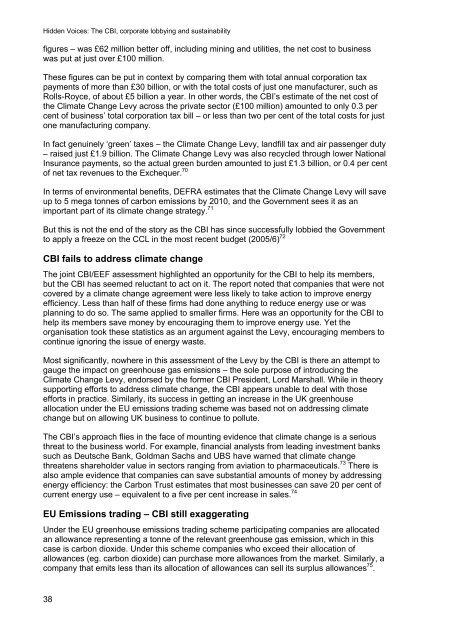hidden_voices
hidden_voices
hidden_voices
You also want an ePaper? Increase the reach of your titles
YUMPU automatically turns print PDFs into web optimized ePapers that Google loves.
Hidden Voices: The CBI, corporate lobbying and sustainabilityfigures – was £62 million better off, including mining and utilities, the net cost to businesswas put at just over £100 million.These figures can be put in context by comparing them with total annual corporation taxpayments of more than £30 billion, or with the total costs of just one manufacturer, such asRolls-Royce, of about £5 billion a year. In other words, the CBI’s estimate of the net cost ofthe Climate Change Levy across the private sector (£100 million) amounted to only 0.3 percent of business’ total corporation tax bill – or less than two per cent of the total costs for justone manufacturing company.In fact genuinely ‘green’ taxes – the Climate Change Levy, landfill tax and air passenger duty– raised just £1.9 billion. The Climate Change Levy was also recycled through lower NationalInsurance payments, so the actual green burden amounted to just £1.3 billion, or 0.4 per centof net tax revenues to the Exchequer. 70In terms of environmental benefits, DEFRA estimates that the Climate Change Levy will saveup to 5 mega tonnes of carbon emissions by 2010, and the Government sees it as animportant part of its climate change strategy. 71But this is not the end of the story as the CBI has since successfully lobbied the Governmentto apply a freeze on the CCL in the most recent budget (2005/6) 72CBI fails to address climate changeThe joint CBI/EEF assessment highlighted an opportunity for the CBI to help its members,but the CBI has seemed reluctant to act on it. The report noted that companies that were notcovered by a climate change agreement were less likely to take action to improve energyefficiency. Less than half of these firms had done anything to reduce energy use or wasplanning to do so. The same applied to smaller firms. Here was an opportunity for the CBI tohelp its members save money by encouraging them to improve energy use. Yet theorganisation took these statistics as an argument against the Levy, encouraging members tocontinue ignoring the issue of energy waste.Most significantly, nowhere in this assessment of the Levy by the CBI is there an attempt togauge the impact on greenhouse gas emissions – the sole purpose of introducing theClimate Change Levy, endorsed by the former CBI President, Lord Marshall. While in theorysupporting efforts to address climate change, the CBI appears unable to deal with thoseefforts in practice. Similarly, its success in getting an increase in the UK greenhouseallocation under the EU emissions trading scheme was based not on addressing climatechange but on allowing UK business to continue to pollute.The CBI’s approach flies in the face of mounting evidence that climate change is a seriousthreat to the business world. For example, financial analysts from leading investment bankssuch as Deutsche Bank, Goldman Sachs and UBS have warned that climate changethreatens shareholder value in sectors ranging from aviation to pharmaceuticals. 73 There isalso ample evidence that companies can save substantial amounts of money by addressingenergy efficiency: the Carbon Trust estimates that most businesses can save 20 per cent ofcurrent energy use – equivalent to a five per cent increase in sales. 74EU Emissions trading – CBI still exaggeratingUnder the EU greenhouse emissions trading scheme participating companies are allocatedan allowance representing a tonne of the relevant greenhouse gas emission, which in thiscase is carbon dioxide. Under this scheme companies who exceed their allocation ofallowances (eg. carbon dioxide) can purchase more allowances from the market. Similarly, acompany that emits less than its allocation of allowances can sell its surplus allowances 75 .38


